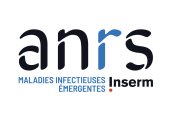A HIV Vaccine Candidate Demonstrates Its Safety and Capacity to Induce an Immune Response – According to the Interim Results of a Phase I Trial
 |
 |
PRESS RELEASE
The initial results of the ANRS VRI06 Phase I1 trial of a preventive HIV vaccine conducted by Inserm-ANRS and the Vaccine Research Institute2 (ANRS and Université Paris-Est Créteil) reveal that the vaccine candidate is safe and induces an early, significant and lasting immune response. These results were presented on February21, 2023 at the international Conference on Retroviruses and Opportunistic Infections (CROI), which took place on February 19–22 in Seattle and online.
Although these preliminary results are encouraging, it is important to note that the efficacy of the vaccine has yet to be demonstrated.
The vaccine candidate CD40.HIVRI.Env developed by the VRI, involves the injection of monoclonal antibodies3 that specifically target a receptor, molecule CD40, on the surface of the dendritic cells4. It is the first time that these cells, which play a key role in educating and activating the immune system, are directly targeted by a vaccine. A HIV envelope protein is attached to the vaccine candidate’s monoclonal antibodies so that the immune system learns how to recognize and neutralize the virus./p>
While the recruitment of the 72 people required to conduct the phase I trial ended in France and Switzerland in October 2022, an interim analysis of the results of the first 36 volunteers included was able to be carried out. The vaccine trial is intended for healthy volunteers who have been instructed to continue to protect themselves from all risk of HIV infection. It was constructed using dose escalation: a first group of 12 people received a subcutaneous dose of 0.3 mg of vaccine at inclusion and at Weeks 4 and 24. The second and third groups then received doses of 1 and 3 mg, respectively, according to the same regimen. The vaccine is combined with the adjuvant Hiltonol®, which aims to strengthen the potential action of the vaccine.
The trial is conducted under double-blind conditions with some volunteers being injected with a placebo. Safety and immunogenicity5 were evaluated at Weeks 6, 26, and 48.
No Serious Side Effects Observed
At Week 26, the results observed in the first 36 volunteers included (average age 34 years, 64% of whom men), show that the vaccine candidate is safe and well tolerated by them. While general reactions and local injection site reactions were common, these side effects were mainly mild or moderate. Two severe side effects were reported and following analysis were found to be unrelated to the vaccination.
Promising Results in Inducing an Effective Immune Response Against HIV
The team of researchers found that the vaccine induced high levels of antibodies to HIV envelope proteins: between 80% and 100% at Week 6 and 100% at Week 26 in all groups (0.3, 1 and 3 mg). These levels remained stable, or decreased slightly, until Week 48. Antibodies targeting a specific area of the HIV envelope (region V1/V2) were also produced. In addition, neutralizing antibodies were detected in 50% of the vaccinated individuals in the 0.3 mg group and in 100% of the other two groups at Week 26.
The researchers also observed the production of CD4 T cells specifically directed against the HIV envelope protein after vaccination, which remain stable until Week 48.
“These initial Phase I results are promising: vaccine CD40.HIVRI.Env has shown both its safety and its capacity to induce early, potent and lasting responses,” reports Prof. Yves Lévy, Director of the VRI. The different antibodies produced and the activation of polyfunctional CD4+ T cells were associated with a reduced risk of HIV infection in a previous vaccine trial, RV144. However, at this early stage in the development of the vaccine, it is important to remember that the volunteers must continue to protect themselves from all risk of HIV infection, since the efficacy of the vaccine will only be evaluated in Phase II/III. “
“This new way of administering the HIV envelope protein by targeting it directly at the dendritic cells could play a key role in strategies combining vaccine regimens, particularly with Env protein, aimed at inducing durable responses.” specifies Prof. Giuseppe Pantaleo, co-investigator of the trial at Lausanne University Hospital.
The team is continuing the follow-up of the volunteers over 12 months. The second step of the trial is continuing with additional groups of volunteers who received CD40.HIVRI.Env in combination with DNA-HIV-PT123, a vaccine currently in development in Phase II/III. This second vaccine is a DNA vaccine that could amplify the immune response.
Find out more:
CD40.HIVRI.ENV Vaccine induces strong and durable immune responses: ANRS/VRI06 Trial
Jean-Daniel Lelièvre (1,2), Christiane Moog (3), Aurélie Wiedemann (1), Christine Lacabaratz (1), Fabio Candotti (4), Melany Durand (1,5), Véronique Rieux (6), Lucile Hardel (1,5), Alpha Diallo (6), Song Ding (7), Mireille Centlivre (1), Rodolphe Thiebaut (1,5,8), Giuseppe Pantaleo (4), Laura Richert (1,5,8), Yves Levy (1)
- Vaccine Research Institute
- CHU Henri Mondor, AP-HP, Créteil
- Inserm UMR S1109 – université de Strasbourg
- Centre hospitalier universitaire vaudois, Lausanne, Suisse
- Inserm UMS 54 MART, université de Bordeaux
- ANRS | Maladies infectieuses émergentes
- EuroVacc Foundation, Lausanne, Suisse
- Inserm U1219/Inria Sistm, université de Bordeaux
CROI 2023
Press contacts:
-
1. Phase I trial: the first phase of a clinical trial is designed to evaluate the non-toxicity of the treatment or vaccine being tested. Phase II seeks to demonstrate its efficacy and optimal dose, whereas Phase III compares its efficacy with a placebo or a reference treatment or vaccine, if available.
-
2. The Vaccine Research Institute (VRI) has French state “laboratory of excellence” accreditation and was established in 2011 by ANRS and Université Paris-Est Creteil (UPEC) in order to conduct research aimed at accelerating the development of effective vaccines against HIV/AIDS.
-
3. Monoclonal antibodies: antibodies are proteins made by the immune system cells. Monoclonal antibodies are antibodies made in a laboratory from a cell clone. They have the ability to recognize and specifically target certain cells.
-
4. Dendritic cells: sentinel cells distributed throughout the body, with the capacity to trigger an immune response.
-
5. Immunogenicity: capacity to produce an immune response.